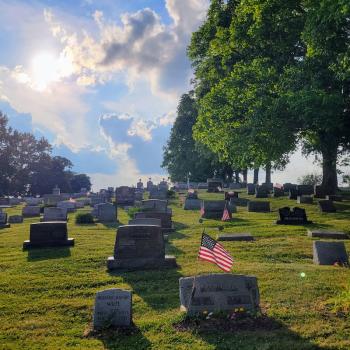It was only with the Spirit’s special assistance that I learned about the existence of these Spanish charismatic prayer groups in the first place. The Spanish-speaking community at my parish is large and vibrant—in fact, probably at least twice the attendance of the English Masses on Saturdays and Sundays—but there is hardly any intermingling outside of daily Mass attendance. The choir director held a joint potluck for the English and Spanish choirs a few months ago, however. Only two adults from the Spanish choir attended, but I sat down with them and soon learned they are also involved in the charismatic prayer group held most Sunday afternoons at our parish. I had no idea such a thing existed (it isn’t listed on the parish website or in the Spanish bulletin even), but I was thrilled to have learned about it by word of mouth, and to make new friends who could introduce me to this fellowship.

My knowledge of Spanish is strictly academic and practically unused for the past 25 years, so having a translator and “Sherpa” seemed essential to my participating. I arranged to meet my new friend one Sunday after the Spanish Mass, and arrived to find the church meeting hall teeming with people. She introduced me to a few people milling about the antehall, and then we walked into the main room, where several dozen people were reciting the rosary in Spanish before the main meeting began. A table was set up with a shrine to Our Lady on the right, a small podium on the left, and at the back of the stage floor were several singers and musicians with amplifiers. We sat in the rows of seats that faced the stage floor, but many families were sitting at tables flanking the sides of the large room, with children coloring and playing as the adults prayed. By the time the rosary was finished, there were probably at least 200 adults in the room, and the youngsters were ushered into a side room for free childcare.
The musicians began with a praise song or two, and then paused for a group of four coordinators to welcome people and offer some introductory spoken prayers. My friend told me to raise my hand as a new person—I had missed that cue. An older woman appeared next to me suddenly and handed me a mug with a picture and quote from Pope Francis on it, as a welcome gift. Several more songs were sung, and then a middle-aged man who works as a secretarial assistant at the parish was invited up to the podium to give a reflection.
This humble layman preached for probably half an hour on prayer, fasting, and almsgiving during Lent, the corporal works of mercy, faith without works is dead, the importance of faith having fruit, as well as the essential requirement that good deeds be motivated by love. His talk was conversational, energetic, and peppered with quotations from the Bible (which many of the participants looked up and read together) and Catholic Catechism. I was surprised how well I was able to follow this extended Spanish sermon, and believe the Spirit helped me understand far more than my scant practice with the language would suggest. One point the speaker made that particularly struck me was that we go out from receiving graces within the Catholic Church to distribute God’s belongings to others. He poked some light fun at the homily the white priest had given an hour or so earlier, mentioning giving up bacon for Lent. He concluded by saying we should go beyond what is easy and focus our Lenten efforts on how we treat our families and giving to others, so that we will be prepared to receive the promise of eternal life at Easter.
The preaching was followed by more praise and worship music, and the children filtered back in. Intercessory prayers were offered, both from a book that people could write petitions in, and spontaneously. There were plenty of raised hands and whispered prayers in the room, but nothing dramatic. There wasn’t any laying on of hands, giving of prophecies, “slaying in the Spirit,” or anything like that. If anyone was whispering in tongues, I couldn’t really tell the difference. When it ended, my friend needed to catch up with someone else, so I walked out unaccompanied. A couple of people greeted me and I did my “pobre” best to speak in Spanish with them. The joy, warmth, and energy of the whole event was palpable.
Having read Pope Francis’s and Fr. Cantalamessa’s words about the charismatic renewal now, I can see clearly how this meeting resembled the virtuous elements they have both highlighted, more than my expectations for a “charismatic” event. The main purpose of the meeting is spontaneous, communal prayer, and stirring into flame the Holy Spirit for the purpose of praise and service to others. No one seemed to be “showing off” to anyone, and the purity of heart I sensed from the event was deeply moving to me. I later interviewed the speaker to learn more about how the group operates with such simplicity and success, but those insights will have to wait for another post.
For now my only hope is that I have left my readers with a thirst for participating in this Third Way of Prayer and a zeal for finding a community for doing so. This is by no means a replacement for private prayer or liturgical prayer, but a rich addition to these traditional forms, a conscious invitation to allow the Spirit to “do something new” among the members of the Body of Christ.











